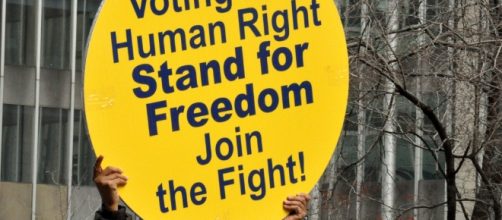Under the guise of stopping voter fraud and preventing those living in the United States illegally from voting, Republican-controlled legislatures have been passing stringent voter registration laws right and left. Conservative Republican legislators in thirty-four states have now introduced or passed laws requiring voters to show a photo ID to register to vote and again at the polls. Some states that already had voter registration laws on the books requiring voters to produce a photo ID tightened their existing statutes. Other states have set requirements for getting a photo ID so high many are unable to get them.
Missouri is the most recent state to pass new voting requirements, with the law taking effect on Thursday, June 8th this year. Missouri Secretary of state, Jay Ashcroft has been touring the state for the past week to educate people on the new law.
Most state laws do not apply to provisional mail ballots
The majority of laws are not applicable for people voting with provisional or mail in ballots. According to election law experts, there have been very few cases of people impersonating eligible voters or through identity theft. The form of fraud that ID laws were designed to prevent has proven to be virtually non-existent since 2011. In states like Kansas during the 2016 presidential election and the 4th district special election in April 2017, persons accused of voter fraud were older and white and it was proven that there was no intent to commit fraud.
In nearly every case people were confused about where their voting location was, had changed residences and forgot to register under their new address, and in one instance a voter didn't know that her candidate had passed away and been replaced by someone else. More importantly, there has not been one case of fraud involving non-citizens to date.
Many think voter registration laws are written to give Republican candidates an advantage
Persons who were not naturalized citizens, or who could not produce a green card or a passport showing their status have been prohibited from voting for years, which makes the Republican contention that their voter registration laws are to prevent voter fraud even more unlikely.
A national survey sponsored by the Center on Budget and Policy Priorities indicated that Conservative Republican-sponsored laws could make it impossible for many American's to vote, especially low-income and African Americans along with the elderly, the disabled, and persons living in isolated rural areas.
With most local and state offices located in the county seat or regional hubs, being able to get a photo ID has become prohibitive for elderly and disabled Americans who don't drive, and for those residing in isolated rural communities with no public transportation. With few internet providers serving rural communities or only providing slow speeds, purchasing a birth certificate or copies of naturalization papers online is not an option.
Although some states provide free ID's, others do not and purchases have to be made with a debit or credit card, which many people do not have. And prior to 1955, some Americans were born at home or in extremely isolated areas where birth certificates were never issued. And some women who never needed a job had no reason to apply for a social security number.
Fighting back against unfair voter registration laws
With the U.S. Congress refusing to do anything to restore protections guaranteed under the U.S. Voting Act of 1965, litigation has become the only way for advocates to try and stop voter suppression tactics through unfair voting rights laws passed by Republicans. Lawsuits were filed in Texas and North Carolina this year against laws that threaten the ability of tens of millions of Americans to vote.
Other states, like VA, are following suit. In Ohio and KS, the public was enraged over the purging of thousands of voter registrations in 2015 and 2016 and took legal action. Kansas Kris Kobach went so far as to tell voters they were unable to vote in federal elections because as KS residents, they didn't have the proper ID to do so. Federal Judges overturned his ruling. But with Conservatives determined to stop anyone who stands in their way, it promises to be a long uphill batter to protect the most vulnerable Americans from their voter suppression and gerrymandering.


